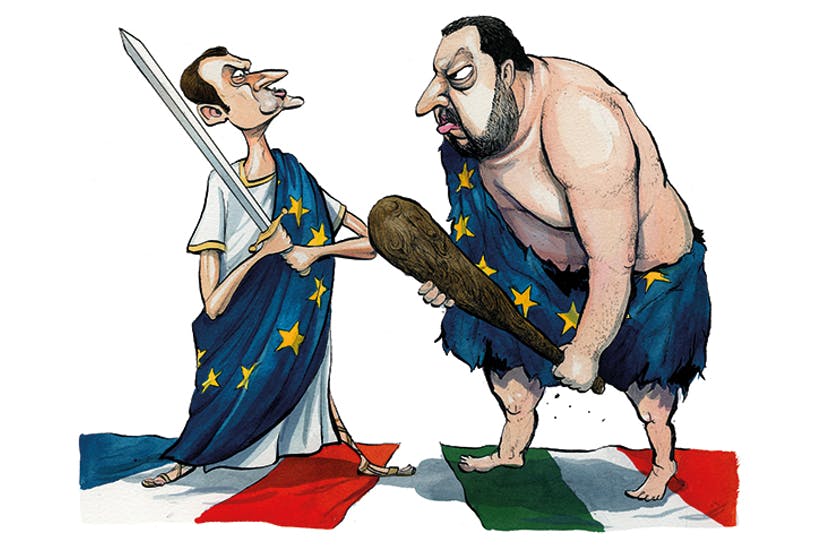In France, discontent has been brewing for years. Emmanuel Macron managed to set it alight by embarking on a series of reforms that sparked the gilet jaunes movement. In Europe it has been brewing too, and now Macron seems to be repeating the trick. Here the antipathy is from populist governments opposed to his ideas, not only on a future Europe but also his lesson-giving in how those countries should govern themselves. International politics are following a similar pattern to national politics. Macron sweeps onto the international stage with new ideas for reforming Europe, he accompanies that with acerbic throw-away quips on the competence and morality of particular leaders, they riposte and, gradually, individual protests coalesce into an axis of angry opposition to the French president.
This week, the Italian ambassador in Paris was summoned to the French foreign ministry for a dressing down over comments made by Italy’s deputy PM. Luigi di Maio had blamed France for Europe’s migration problems, saying France had “never stopped colonising tens of African states”, resulting in Africa’s impoverishment. As a result, he called for the EU to apply sanctions against France. Di Maio isn’t the only Italian politician stirring up trouble. On Wednesday, the country’s other deputy PM Matteo Salvini expressed support for the gilets jaunes on Facebook, saying that he hoped the French people would soon be rid of a ‘bad president’.
Macron is not taking the criticism lightly. Just as Macron was signing a new Franco-German friendship treaty with Angela Merkel, a French presidential source released a statement declaring that at the European elections in May “the European project” would confront those “who seek to destroy it”; the statement also criticised the ‘ludicrous comments from the Italian government.’ The French minister for Europe Natalie Loiseau also stepped in earlier this month claiming that France refrained from ‘giving lessons to Italy’.But this is precisely what Macron has been doing to Italy since its populist government came to power last June; just a few weeks later, he was busy describing Italy’s politics as ‘populist leprosy’. Macron’s international finger-pointing has also trenchantly targeted Hungary, Poland, and Austria for their nationalistic policies. More recently, he has branded Britain’s pro-Brexit politicians ‘liars’.
Macron’s caustic comments certainly lack tact. But so, too, do the words of some of Macron’s critics. Back in August, Salvini and Viktor Orban, the Hungarian PM, met in Milan to form a united front for change in Europe. Orban stated that there were ‘two sides at the moment in Europe. One is led by Macron who is supporting migration. The other is supported by countries who want to protect their borders. Hungary and Italy belong to the latter’. This animosity is not restricted to immigration issues. Their pact also seeks ‘to change the European Commission’. It’s clear that the anti-Macron front is only growing. This month, Salvini was in Warsaw to seal a new partnership with the nationalist Polish government to trigger what he called a “European spring” that would break the strength of France and Germany in the EU.
Why is this war of words important? Precisely because, as with the gilets jaunes, Macron is becoming the lightening rod for a pervasive discontent with the European project. The picture is increasingly of an asymmetric EU in which east central Europe, now joined by Italy, is disenchanted with the European project as defined by Franco-German initiative and executed by European Commission civil servants schooled and trained in that vein. The feeling among central and eastern European states who joined the European project after the fall of the Berlin Wall is that they were made to sign up to the Franco-German model and that any deviance from it will not be tolerated. Until now, Europe’s divide – between an extended Visegrad group and a French-led bloc – has been small. But this split is growing, as Italy increasingly looks to the east for diplomatic allies. Macron’s hectoring and undiplomatic international quips – together with his quest for further European integration to combat national sovereignty – are crystallising that division. His ambition to lead a movement to promote further European integration is provoking foreign leaders to donning metaphorical yellow jackets.
Professor John Keiger is Director of Research at the Department of Politics and International Studies at the University of Cambridge






Comments